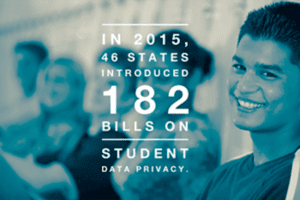This post is co-authored by Rachel Anderson, Senior Associate, Policy and Advocacy at the Data Quality Campaign, and Geoff Zimmerman, Associate Director of Data Utilization for StriveTogether.
Data-driven decision-making is critical to neighborhood-based strategies, community schools initiatives, and other outcomes-focused community-based organizations. The ability of community organizations to securely access appropriate student-level data from schools ensures that we can understand what programs and actions really provide improved education results for kids.
But data sharing comes with the crucial responsibility to use it effectively and responsibly, and to protect student privacy. And, community organizations need to understand the increasing amount of both federal and state legislation on the use of student data.
Over the last two years, nearly every state has considered legislation around student data privacy. In 2015 alone, 46 states have introduced 182 bills on the subject and 15 of these states have passed new student data privacy laws. While these bills and laws reflect the unique privacy and security conversations happening in each state, there are also some clear themes nationwide. And many of these themes can have important implications for community partners who need information about their students in order to best meet their needs.
For example, many states are thinking about their role in supporting good data use and protection practices by their districts. In 2014, nine states passed laws that gave school districts new or expanded responsibilities around student data privacy and security. This year, many states are thinking about the supports and guidance districts will need from the state in order to fulfill their new roles. States are also working to provide transparency and build trust with educators and the public that education data are being used to support students and improve education in the state, looking at lots of ways to make education data useful, and focusing on the critical need to safeguard student data. Here’s the latest on state policy efforts:
- North Dakota now requires data sharing approval by the school board and implements data governance, transparency, and supports including data use training.
- Virginia has a new law to direct the state to develop a model data security plan for districts and to designate a chief data security officer to assist local school divisions their data use and security policies.
- Minnesota considered a bill to create student data backpacks to give families more control of their student’s data.
- Florida looked at early warning systems that help keep students on track for success.
- Washington introduced a bill to support collaboration between educators by looking at multiple data sources to help identify student needs.
Student data privacy is also an issue under increasing consideration at the federal level. And again, these conversations and decisions can have important implications for community partners and their ability to securely access data about the students they serve.
- Lawmakers in the House recently introduced an amendment to the Family Educational Rights and Privacy Act (FERPA)—the most prominent federal student data privacy law. FERPA governs when student records and be disclosed, making any potential changes significant to the ways states and districts work with community partners.
- Student data privacy has also been part of recent efforts to reauthorize the Elementary and Secondary Education Act (ESEA); as a part of the Senate’s work on their version of the bill they adopted an amendment to create a Student Privacy Policy Committee. This committee, which would represent parents, educators, education privacy and technology experts, and state and district leaders, would be charged with studying and developing recommendations around student data privacy and parental rights. If implemented, this committee could help to develop the guidance and resources states and districts need in order to implement good data access and use practices within communities.
- Other recently introduced federal privacy bills include the Student Digital Privacy and Parental Rights Act and theSAFE KIDS Act, both of which seek to safeguard student data while allowing for the use of data and technology.
To help communities develop effective data sharing relationships, learn best practices to protect student data, and understand the latest student privacy legislation, StriveTogether and the Data Quality Campaign are partnering to host the Student Data Privacy, Policy, and Advocacy Convening on Friday, August 21 in Washington, D.C. This event brings together over 100 education stakeholders from across the country to dig deeper into the policy and advocacy issues that arise when school-community data sharing partnerships are formed. Attendees will learn more about resources from the field to address these challenges, the current privacy policy landscape, and what an emerging national advocacy agenda might look like.
Follow along and join the conversation with convening attendees this week on Twitter using #datadrivesresults.


